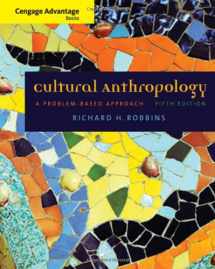
Cengage Advantage Books: Cultural Anthropology: A Problem-Based Approach
Book details
Summary
Description
Learn anthropology within a strong active learning environment when you open Robbins' unique Fifth Edition. This brief, cost-effective text presents a variety of questions focused on the most important issues anthropologists study in first of-of-its-kind, problem-based format. You'll find yourself thinking critically about today's world as you read engaging Chapter Openers, complete integrated exercises, and review unique Case Studies in Doing Anthropology at the end of each chapter, now with new locator maps for your convenience. Robbins's text presents a variety of questions focused on the most important issues anthropologists study in a unique, problem-based format. Within the book's engaging narrative, you'll learn how to analyze your own culture as a basis for understanding the cultures of others. Presentations organized around problems rather than topics, creating a natural discussion of traditional concerns, such as kinship, caste, gender roles, and religion. Meaningful questions integrated throughout further guide you in exploring these subjects.


We would LOVE it if you could help us and other readers by reviewing the book
Book review



